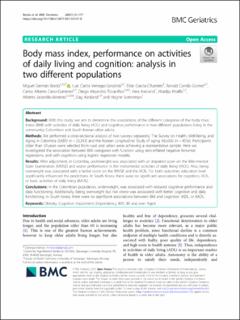| dc.contributor.author | Borda, Miguel Germán | |
| dc.contributor.author | Venegas-Sanabria, Luis Carlos | |
| dc.contributor.author | Garcia-Cifuentes, Elkin | |
| dc.contributor.author | Gomez, Ronald Camilo | |
| dc.contributor.author | Cano-Gutierrez, Carlos Alberto | |
| dc.contributor.author | Tovar-Rios, Diego Alejandro | |
| dc.contributor.author | Aarsland, Vera Vårin Birkemo | |
| dc.contributor.author | Khalifa, Khadija | |
| dc.contributor.author | Jaramillo-Jiménez, Alberto | |
| dc.contributor.author | Aarsland, Dag | |
| dc.contributor.author | Sønnesyn, Hogne | |
| dc.date.accessioned | 2023-02-15T10:49:04Z | |
| dc.date.available | 2023-02-15T10:49:04Z | |
| dc.date.created | 2021-03-24T11:58:55Z | |
| dc.date.issued | 2021 | |
| dc.identifier.citation | Borda, M. G., Venegas-Sanabria, L. C., Garcia-Cifuentes, E., Gomez, R. C., Cano-Gutierrez, C. A., Tovar-Rios, D. A., ... & Soennesyn, H. (2021). Body mass index, performance on activities of daily living and cognition: analysis in two different populations. BMC geriatrics, 21, 1-11. | en_US |
| dc.identifier.issn | 1471-2318 | |
| dc.identifier.uri | https://hdl.handle.net/11250/3051021 | |
| dc.description.abstract | Background
With this study, we aim to determine the associations of the different categories of the body mass index (BMI) with activities of daily living (ADL) and cognitive performance in two different populations living in the community; Colombian and South Korean older adults.
Methods
We performed a cross-sectional analysis of two surveys separately; The Survey on Health, Well-Being, and Aging in Colombia (SABE) (n = 23,343) and the Korean Longitudinal Study of aging (KLoSA) (n = 4556). Participants older than 50 years were selected from rural and urban areas achieving a representative sample. Here we investigated the association between BMI categories with function using zero-inflated negative binomial regressions, and with cognition using logistic regression models.
Results
After adjustment, in Colombia, underweight was associated with an impaired score on the Mini-mental State Examination (MMSE) and worse performance in the instrumental activities of daily living (IADL). Also, being overweight was associated with a better score on the MMSE and the IADL. For both outcomes education level significantly influenced the predictions. In South Korea, there were no significant associations for cognition, IADL, or basic activities of daily living (BADL).
Conclusions
In the Colombian population, underweight, was associated with reduced cognitive performance and daily functioning. Additionally, being overweight but not obese was associated with better cognition and daily functioning. In South Korea, there were no significant associations between BMI and cognition, IADL, or BADL. | en_US |
| dc.language.iso | eng | en_US |
| dc.publisher | BMC | en_US |
| dc.rights | Navngivelse 4.0 Internasjonal | * |
| dc.rights.uri | http://creativecommons.org/licenses/by/4.0/deed.no | * |
| dc.title | Body mass index, performance on activities of daily living and cognition: analysis in two different populations | en_US |
| dc.type | Peer reviewed | en_US |
| dc.type | Journal article | en_US |
| dc.description.version | publishedVersion | en_US |
| dc.rights.holder | The authors | en_US |
| dc.subject.nsi | VDP::Medisinske Fag: 700 | en_US |
| dc.source.pagenumber | 11 | en_US |
| dc.source.volume | 21 | en_US |
| dc.source.journal | BMC Geriatrics | en_US |
| dc.identifier.doi | 10.1186/s12877-021-02127-8 | |
| dc.identifier.cristin | 1900586 | |
| cristin.ispublished | true | |
| cristin.fulltext | original | |
| cristin.qualitycode | 1 | |

